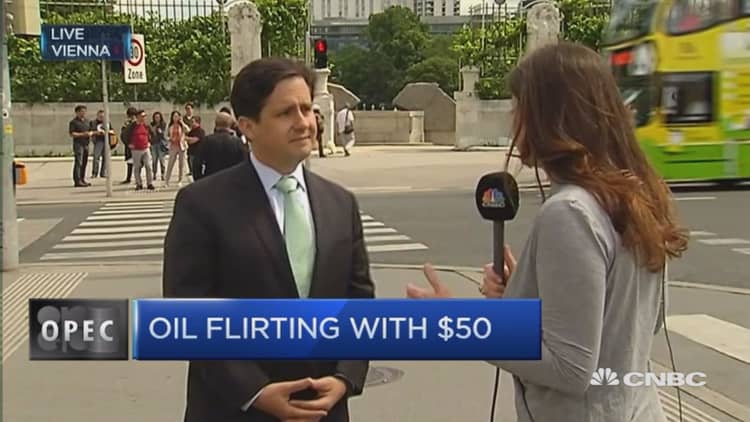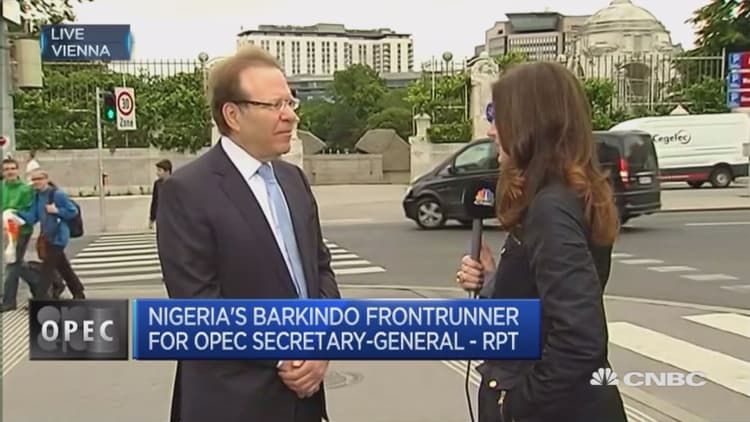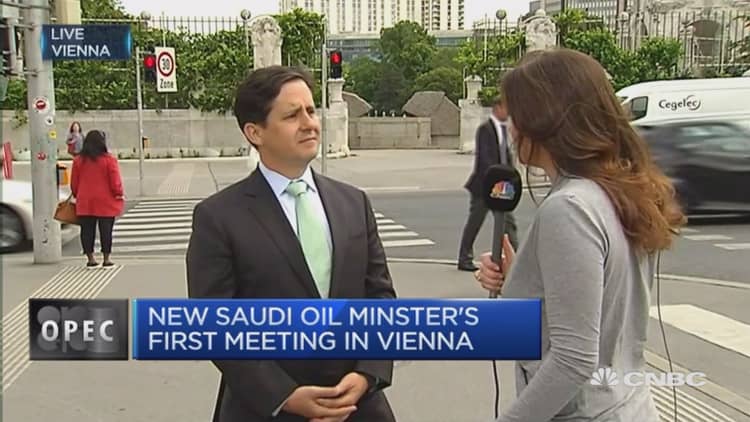



Oil prices have dipped ahead of the closely-watched meeting of OPEC producers on Thursday but well-respected figures in the oil industry believe that prices are still too low and that the only way is up.
"Oil's going up because the oil market is rebalancing," Gary Ross, the founder, executive chairman and head of Global Oil at PIRA Energy Group, told CNBC on Wednesday.
"We're seeing non-OPEC supply decline quite substantially and, add in the supply interruptions which are humungous and we're seeing the surplus going down a million barrels a day in the second quarter already which is way earlier than most people expected."
Ross' comments are closely followed by oil market watchers as he has built up a reputation for accurate predictions on the oil price. In March, Ross told clients of his consultancy PIRA that he believed the "lows are in" for crude which was then around $30 a barrel.
Since then, prices have risen to currently trade around $50 a barrel fueling hopes that an imbalance in supply and demand was finally over. Oil prices dipped on Tuesday and Wednesday ahead of the OPEC meeting on Thursday and on concerns over China's economy after mixed signals from its latest purchasing manager's index (PMI).
Crude also dipped after the United Arab Emirates' oil minister said on Tuesday that he was happy with the oil price which he noted was correcting upwards, dampening hopes of any form of output quota of production cut by OPEC.
Nigeria's oil minister made similar remarks on Wednesday and while he did not want to speculate about the OPEC meeting, said there was less urgency for OPEC members this time compared to the last meeting in April in Doha where expectations of a production freeze were dashed.
Speaking to CNBC in Vienna ahead of the OPEC meeting, Ross agreed and said that prices were still too low for a flood of supply to come back onto the market. He also forecast "no breaking news" from Vienna.
"We've seen this dramatic increase in price and prices were way too low when they were in their $20s and now we're back to a level that's still too low. It's still not high enough to bring forth incremental shale crude supply which is really a short-term incremental supply to the market. So if you're not going to get investment at $50 (a barrel), then the price inevitably is going to have to go higher as this rebalancing continues," he said.
'System failure'
There have been some concerns that too quick a rebound in oil prices could prompt higher-cost producers, such as those in the U.S. and Canada, to ramp up production which had been closed down or constrained in the period of low oil prices.
However, Ross said that that a "system failure" within oil production industries around the word meant that global oil supply would remain muted while demand grew.
"Whether it be producing or exporting countries, they can't afford to do things that they were doing before. In Nigeria you have 16,000 militants and some now attacking industry infrastructure, in Venezuela, you have service companies walking out and we're seeing a lack of maintenance around the world. So there's no doubt that this is going to have an impact on supply," he said.
"At the same time, the demand is very strong, Demand the way we measure it was up over 2 million barrels per day in the first quarter."
Beware a boom
With oil prices on the rise, all eyes are now on how OPEC, and non-OPEC producers around the world will react in terms of output.
Bob McNally, president of the Rapidan Group, told CNBC on Wednesday that if the oil price recovers to $55-$60 a barrel, U.S. shale oil production would be "ready to go."
"I think if we see crude go back to the $55-$60 level we're going to see rigs going back to work…and I think they're confident that the bottom is really in this time. I think you'll see rigs deploy and capital deploy and the real question is how quickly they can get labor back."
He said that major producers like Saudi Arabia were just as wary of a boom in prices and the potential instability of a "boom and bust" cycle, however.
"Saudi Arabia is, and I think rightfully so, just as concerned about the next boom in prices to come, as the bust we're in right now. They are very concerned that the price drop we've seen and the negative impact that's had on investment and high-cost producers is sowing the seeds of the next price boom. I think they're getting ready for that."
"I don't think they (Saudi Arabia) see a problem over whether crude is going to be $80 at the initial public offering of (around a 5 percent stake in state oil firm) Saudi Aramco but I think they're more concerned about the price blowing back into the $100s and causing macro-economic problems."
Correction: This story has been corrected to show McNally was speaking on Wednesday





